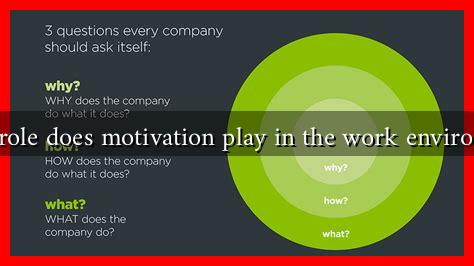-
Table of Contents
The Role of Motivation in the Work Environment
Motivation is a critical factor that influences employee performance, satisfaction, and overall workplace dynamics. In a world where businesses strive for efficiency and productivity, understanding the role of motivation can lead to significant improvements in organizational success. This article explores the various dimensions of motivation in the work environment, its impact on employee behavior, and strategies to enhance motivation within teams.
Understanding Motivation
Motivation can be defined as the internal and external factors that stimulate desire and energy in individuals to be continually interested and committed to a task. It is the driving force behind human actions and can be categorized into two main types:
- Intrinsic Motivation: This type of motivation comes from within the individual. It is driven by personal satisfaction, interest, or the joy of completing a task. For example, an employee who enjoys problem-solving may be intrinsically motivated to tackle complex projects.
- Extrinsic Motivation: This motivation is influenced by external factors such as rewards, recognition, or the fear of negative consequences. For instance, an employee may work harder to receive a bonus or promotion.
The Impact of Motivation on Employee Performance
Motivation plays a pivotal role in determining how employees perform their tasks. Research has shown that motivated employees are more productive, engaged, and committed to their work. According to a study by Gallup, organizations with highly engaged employees experience 21% greater profitability and 17% higher productivity compared to those with low engagement levels.
Here are some key ways motivation impacts employee performance:
- Increased Productivity: Motivated employees tend to work more efficiently and produce higher quality work. They are more likely to go above and beyond their basic job requirements.
- Enhanced Job Satisfaction: When employees feel motivated, they are more likely to enjoy their work, leading to higher job satisfaction and lower turnover rates.
- Improved Team Dynamics: Motivation fosters a positive work environment where collaboration and teamwork thrive. Motivated employees are more likely to support their colleagues and contribute to a cohesive team atmosphere.
Case Studies: Successful Motivation Strategies
Several organizations have successfully implemented motivation strategies that have led to remarkable improvements in employee performance and satisfaction. Here are a few notable examples:
- Google: Google is renowned for its innovative work culture that emphasizes intrinsic motivation. The company allows employees to spend 20% of their time on personal projects, leading to the development of successful products like Gmail and Google News.
- Salesforce: Salesforce employs a robust recognition program that celebrates employee achievements. This extrinsic motivation strategy has resulted in high employee engagement scores and a strong company culture.
- Zappos: Zappos focuses on creating a fun and engaging work environment. Their emphasis on employee happiness has led to exceptional customer service and loyalty, showcasing the direct link between motivated employees and customer satisfaction.
Strategies to Enhance Motivation in the Workplace
To cultivate a motivated workforce, organizations can implement several strategies:
- Set Clear Goals: Establishing clear, achievable goals helps employees understand their roles and the expectations placed upon them.
- Provide Opportunities for Growth: Offering training and development programs can enhance employees’ skills and increase their intrinsic motivation.
- Recognize and Reward Achievements: Regularly acknowledging employee contributions fosters a sense of value and encourages continued effort.
- Encourage Open Communication: Creating an environment where employees feel comfortable sharing ideas and feedback can enhance engagement and motivation.
Conclusion
Motivation is a fundamental element that shapes the work environment and influences employee performance. By understanding the different types of motivation and implementing effective strategies, organizations can create a culture that fosters engagement, productivity, and satisfaction. As demonstrated by successful companies, investing in employee motivation not only benefits the workforce but also drives organizational success. In a competitive business landscape, prioritizing motivation can be the key to unlocking the full potential of employees and achieving long-term goals.
For further reading on motivation in the workplace, consider exploring resources from the Gallup Organization and Forbes.


